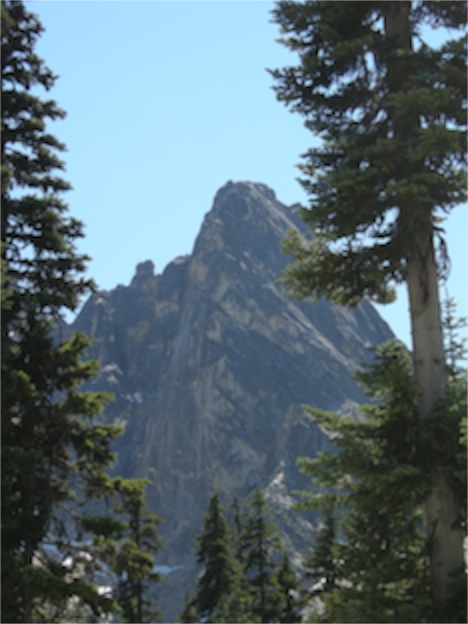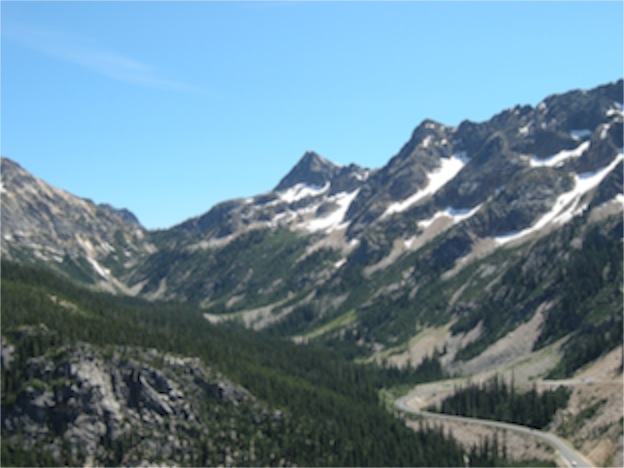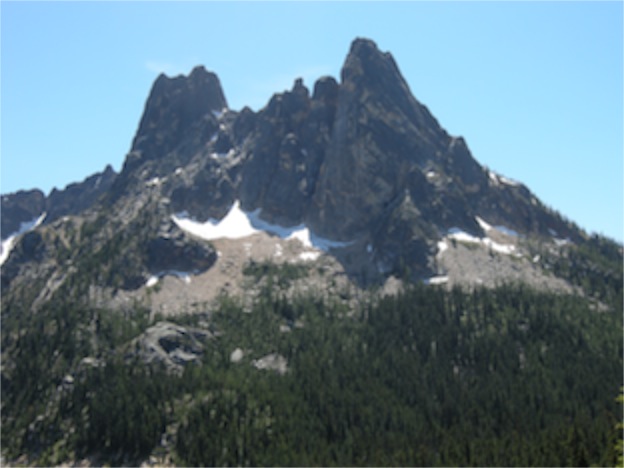The North Cascades
12/07/13 06:22
Our second night in a National Park Service campground has begun the transition from work to vacation for me. I haven’t checked my e-mail since Tuesday – a rare thing for me. Today we’ll arrive at our destination campground, which has Internet service and full hookups so I’ll probably get back in touch a little bit. It isn’t as if we were out of contact as we used to be when on vacation earlier in our careers. The cell phones work even in very remote places along our travels these days.
I wake this morning with great anticipation of a wonderful time because we will see our family this afternoon. Our son and grandson will pick up our daughter and son-in-law at Sea-Tac Airport and drive to the campground. We are really looking forward to a week of being together face-to-face. We’ve planned a lot of fun activities and the San Juan Islands are an area that we have wanted to explore for many years. We’re relatively familiar with Whidbey Island, as my brother lived there for many years and we have visited often. But we have seen little of other islands. And for this trip we’ve scheduled a whale watching tour which will be an entirely new adventure for us.
 We’ve pulled at least nine mountain passes on this trip. Washington Pass, on the North Cascades Highway is as steep and as long a pull as you’ll find with the possible exception of the Beartooth Highway between Red Lodge and Cook City, Montana when pulled from Red Lodge. The truck performed perfectly with temperatures staying well within the normal range. The trailer handled very well with no hot brakes or other problems. It was a kind of test. We’re new to traveling with a camp trailer and we wanted to make sure that the equipment was able to go where we want to go. So far we’re very pleased. The camper also handles well when we’re “off grid.” The batteries have plenty of power for the lights and other electrical things we use, including an inverter to charge computer batteries, etc. The propane and water tanks are large enough for many nights without hookups. We’ve found places to dump our wastewater each day, but clearly we have capacity for four days without needing to dump.
We’ve pulled at least nine mountain passes on this trip. Washington Pass, on the North Cascades Highway is as steep and as long a pull as you’ll find with the possible exception of the Beartooth Highway between Red Lodge and Cook City, Montana when pulled from Red Lodge. The truck performed perfectly with temperatures staying well within the normal range. The trailer handled very well with no hot brakes or other problems. It was a kind of test. We’re new to traveling with a camp trailer and we wanted to make sure that the equipment was able to go where we want to go. So far we’re very pleased. The camper also handles well when we’re “off grid.” The batteries have plenty of power for the lights and other electrical things we use, including an inverter to charge computer batteries, etc. The propane and water tanks are large enough for many nights without hookups. We’ve found places to dump our wastewater each day, but clearly we have capacity for four days without needing to dump.
 North Cascades National Park is one of the newer parks in the system. It is an amazing place for people who love mountains. There are high spires and alpine meadows and acres and acres of trees growing on steep slopes. Like the rest of the Cascades, the mountains are rainforest on the western slopes and nearly desert on the eastern slopes. The contrast is dramatic and incredible. Yesterday at Kettle Falls, the ground was dry and crackly when we walked. The trees were primarily Ponderosa Pine, though they were taller than they grow at home. Today we are surrounded by Cedar, Douglas Fir and Hemlock trees that stretch hundreds of feet into the sky. The ground is lush with ferns and moss on almost every surface. When I went out to paddle last night, I came back with muddy feet.
North Cascades National Park is one of the newer parks in the system. It is an amazing place for people who love mountains. There are high spires and alpine meadows and acres and acres of trees growing on steep slopes. Like the rest of the Cascades, the mountains are rainforest on the western slopes and nearly desert on the eastern slopes. The contrast is dramatic and incredible. Yesterday at Kettle Falls, the ground was dry and crackly when we walked. The trees were primarily Ponderosa Pine, though they were taller than they grow at home. Today we are surrounded by Cedar, Douglas Fir and Hemlock trees that stretch hundreds of feet into the sky. The ground is lush with ferns and moss on almost every surface. When I went out to paddle last night, I came back with muddy feet.
Because it is a relatively new park, the use of North Cascades National Park is more varied than other National Parks. There are at least two major dams within the park that back up lakes. Ross Lake stretches all the way to Canada, with the only road access being from north of the boarder. There is a portage from Diablo Lake, where we are camped. This means that boats can be used to go deep into the wilderness on the surface of the lake, providing access points for hikers and campers that would not otherwise exist. To the southeast, Lake Chelin is a huge natural lake that was used by natives as a travel route long before European settlers arrived. There are several archeological sites within the wilderness that show evidence of human use of this land for more than 100,000 years.
North Cascades has more glaciers than any place in the United States outside of Alaska. Glaciers have a unique way of grinding and crushing the rocks. The runoff from the glaciers carries this rock dust and the cold, clear water has a unique green color that is found only in lakes that are fed from glaciers. I haven’t paddled in such a lake since we traveled in British Columbia years ago. Paddling on Diablo Lake last evening brought back memories of those adventures.
 The Cascades, of course, are named from the dramatic waterfalls that are prevalent throughout the region. We passed many waterfalls and enjoyed the beauty of such places. The sounds match the sights in their beauty and emotional impact. There are places that touch the soul, and this is one of them. It seems appropriate to us that the area is being preserved as a National Park.
The Cascades, of course, are named from the dramatic waterfalls that are prevalent throughout the region. We passed many waterfalls and enjoyed the beauty of such places. The sounds match the sights in their beauty and emotional impact. There are places that touch the soul, and this is one of them. It seems appropriate to us that the area is being preserved as a National Park.
As a builder of canoes and kayaks, I feel a special kinship with cedar trees. The wood from these trees is perfect for the kind of building that I do. It is soft enough to make the complex curves of my craft and it is water resistant. Here in the forest, the trees are almost constantly wet and they grow to massive sizes. There is still a lot of discussion about what the proper balance between harvesting timber and preserving forests. My consumption of cedar in a lifetime will be less than one tree, but I still wonder and visiting the forest where the cedars grow is a gentle reminder to me that their wood is a precious commodity and not to be wasted or taken lightly. The canoe that I paddle the most was made more than a dozen years ago and I have a responsibility not only to make it last for my lifetime, but to find someone who will treasure and care for it after I am gone. Having used the wood, it is a trust with the forest to use it well. The kayak I brought on this trip is made from fence cedar, harvested from the small cedar trees that grow along rivers throughout the west. It seems quite at home in this area, however.
So we continue our adventures and continue to enjoy exploring this wonderful world.
I wake this morning with great anticipation of a wonderful time because we will see our family this afternoon. Our son and grandson will pick up our daughter and son-in-law at Sea-Tac Airport and drive to the campground. We are really looking forward to a week of being together face-to-face. We’ve planned a lot of fun activities and the San Juan Islands are an area that we have wanted to explore for many years. We’re relatively familiar with Whidbey Island, as my brother lived there for many years and we have visited often. But we have seen little of other islands. And for this trip we’ve scheduled a whale watching tour which will be an entirely new adventure for us.


Because it is a relatively new park, the use of North Cascades National Park is more varied than other National Parks. There are at least two major dams within the park that back up lakes. Ross Lake stretches all the way to Canada, with the only road access being from north of the boarder. There is a portage from Diablo Lake, where we are camped. This means that boats can be used to go deep into the wilderness on the surface of the lake, providing access points for hikers and campers that would not otherwise exist. To the southeast, Lake Chelin is a huge natural lake that was used by natives as a travel route long before European settlers arrived. There are several archeological sites within the wilderness that show evidence of human use of this land for more than 100,000 years.
North Cascades has more glaciers than any place in the United States outside of Alaska. Glaciers have a unique way of grinding and crushing the rocks. The runoff from the glaciers carries this rock dust and the cold, clear water has a unique green color that is found only in lakes that are fed from glaciers. I haven’t paddled in such a lake since we traveled in British Columbia years ago. Paddling on Diablo Lake last evening brought back memories of those adventures.

As a builder of canoes and kayaks, I feel a special kinship with cedar trees. The wood from these trees is perfect for the kind of building that I do. It is soft enough to make the complex curves of my craft and it is water resistant. Here in the forest, the trees are almost constantly wet and they grow to massive sizes. There is still a lot of discussion about what the proper balance between harvesting timber and preserving forests. My consumption of cedar in a lifetime will be less than one tree, but I still wonder and visiting the forest where the cedars grow is a gentle reminder to me that their wood is a precious commodity and not to be wasted or taken lightly. The canoe that I paddle the most was made more than a dozen years ago and I have a responsibility not only to make it last for my lifetime, but to find someone who will treasure and care for it after I am gone. Having used the wood, it is a trust with the forest to use it well. The kayak I brought on this trip is made from fence cedar, harvested from the small cedar trees that grow along rivers throughout the west. It seems quite at home in this area, however.
So we continue our adventures and continue to enjoy exploring this wonderful world.